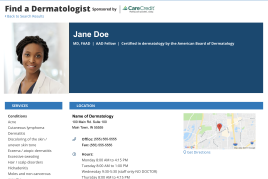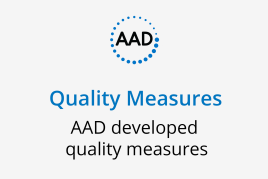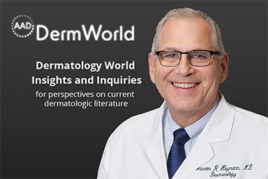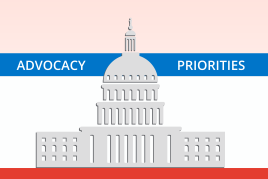Aleppo to Zika: 2016’s anxieties may lead to 2017’s dermatoses
 By Warren R. Heymann, MD
By Warren R. Heymann, MDDec. 17, 2016
“Doctor, did stress cause my breakout?”
How many times have your patients with acne, psoriasis, or urticaria asked you this question? My usual response is “No, it didn’t cause it, but it sure can make it worse!”
The first time I recall losing sleep worrying about world events was as a 7-year-old boy during the Cuban Missile Crisis. My oldest brother George crept into my bed and warned me (alarmed me, really) that Russia might attack us with nuclear weapons. I probably didn’t know what that meant, but it sounded ominous. If you accept the theory that anxiety leads to stress, which, in turn, aggravates dermatoses, then 2016 has been a banner year for potential stressors. The following is a partial list, from A to Z, of issues that have aggravated my insomnia:
Aleppo
Black Lives Matter
China
Drug costs
Electoral College
Fake news
Global warming
Health care
ISIS
Japanese tsunamis
Korean nuclear weapons
Litigious society
MACRA
Narcissistic candidates
Opiate addiction
PQRS
Quality control
RAC audits
Sleep deprivation
T (guess who)
Ukraine
Vladimir Putin
West Bank
Xenophobia
Yazidis
Zika
The literature is replete with new information confirming the association of stress with aggravated dermatoses. In a survey of 1560 adolescents (aged 11-19 years), of whom 51.2% had acne, sleeping disorders were noted in 16.5% of those without acne and 20.3% among pupils with acne (p>0.05). When recalling symptoms of the past week, sleep disorders due to acne were reported by 16.6% of pupils (1). A cross-sectional study was conducted among 101 consecutively recruited outpatients with plaque psoriasis. A psychosocial interview was performed including questions concerning stress reactivity in relation to onset and exacerbation. Sixty-four patients (63%) reported a subjective association between disease exacerbation and stress (2). It has been demonstrated that in psoriatic mice there were significant increases in specific pro-inflammatory cytokines (IL-1β, IL-6 and IL-12) and decreases in the anti-inflammatory cytokine (IL-10) after sleep deprivation, which were normalized after 48 hours of sleep rebound (3). According to Weller et al, chronic spontaneous urticaria (CSU) is often associated with psychiatric comorbidities such as anxiety and depression. These conditions are widely thought to cause, drive and/or maintain CSU, and have been reported as making an important contribution to the low quality of life in patients with CSU. Almost half of all patients with CSU have autoreactive CSU that can be readily diagnosed by the autologous serum skin test. The authors carried out a study on two groups of patients with CSU, and found that the anxiety and depression scores were lower in patients with autoreactive CSU than in those with nonautoreactive CSU, suggesting that autoreactive CSU represents a distinct CSU subgroup with a different disease pattern and a lower rate of psychiatric comorbidities (4).
I never wanted to be a psychiatrist; if you aspire to be successful dermatologist, however, you need to be. Anxiety, stress, and sleep deprivation are taking a toll on our patient’s skin. Aside from seeing a therapist or prescribing SSRIs (which may certainly be indicated for some patients), perhaps we should suggest that our patients (and ourselves!) turn off CNN once in a while, listen to classical music, practice “mindfulness”, breathe when your iWatch flashes the reminder, meditate, exercise, give a hug, and get one in return. Finally, we are not always passive victims of circumstance; we have the capability of Tikkun Olam — repairing the world — when we see injustice.
I wish all of us, especially our patients, a peaceful 2017. The anxieties will likely remain, but let’s make a New Year’s resolution to improve our coping skills.
1. Tasoula E, et al. The impact of acne vulgaris on quality of life and psychic health in young adolescents in Greece. Results of a population survey. An Bras Dermatol 2012; 87: 862-9.
2. Remröd C. Subjective stress reactivity in psoriasis – a cross sectional study of associated psychological traits. BMC Dermatol 2015 May 2: 15:6.
3. Hirotsu C, et al. Sleep loss and cytokines levels in an experimental model of psoriasis. PLoS One 2012; e51183.
4. Weller K, et al. Anxiety and depression seem less common in patients with autoreactive chronic spontaneous urticarial. Clin Exp Dermatol 2013; 38: 870-3.
All content found on Dermatology World Insights and Inquiries, including: text, images, video, audio, or other formats, were created for informational purposes only. The content represents the opinions of the authors and should not be interpreted as the official AAD position on any topic addressed. It is not intended to be a substitute for professional medical advice, diagnosis, or treatment.
DW Insights and Inquiries archive
Explore hundreds of Dermatology World Insights and Inquiries articles by clinical area, specific condition, or medical journal source.
All content solely developed by the American Academy of Dermatology
The American Academy of Dermatology gratefully acknowledges the support from Incyte Dermatology.
 Make it easy for patients to find you.
Make it easy for patients to find you.
 Meet the new AAD
Meet the new AAD
 2022 AAD VMX
2022 AAD VMX
 AAD Learning Center
AAD Learning Center
 Need coding help?
Need coding help?
 Reduce burdens
Reduce burdens
 Clinical guidelines
Clinical guidelines
 Why use AAD measures?
Why use AAD measures?
 Latest news
Latest news
 New insights
New insights
 Combat burnout
Combat burnout
 Joining or selling a practice?
Joining or selling a practice?
 Advocacy priorities
Advocacy priorities
 Promote the specialty
Promote the specialty

